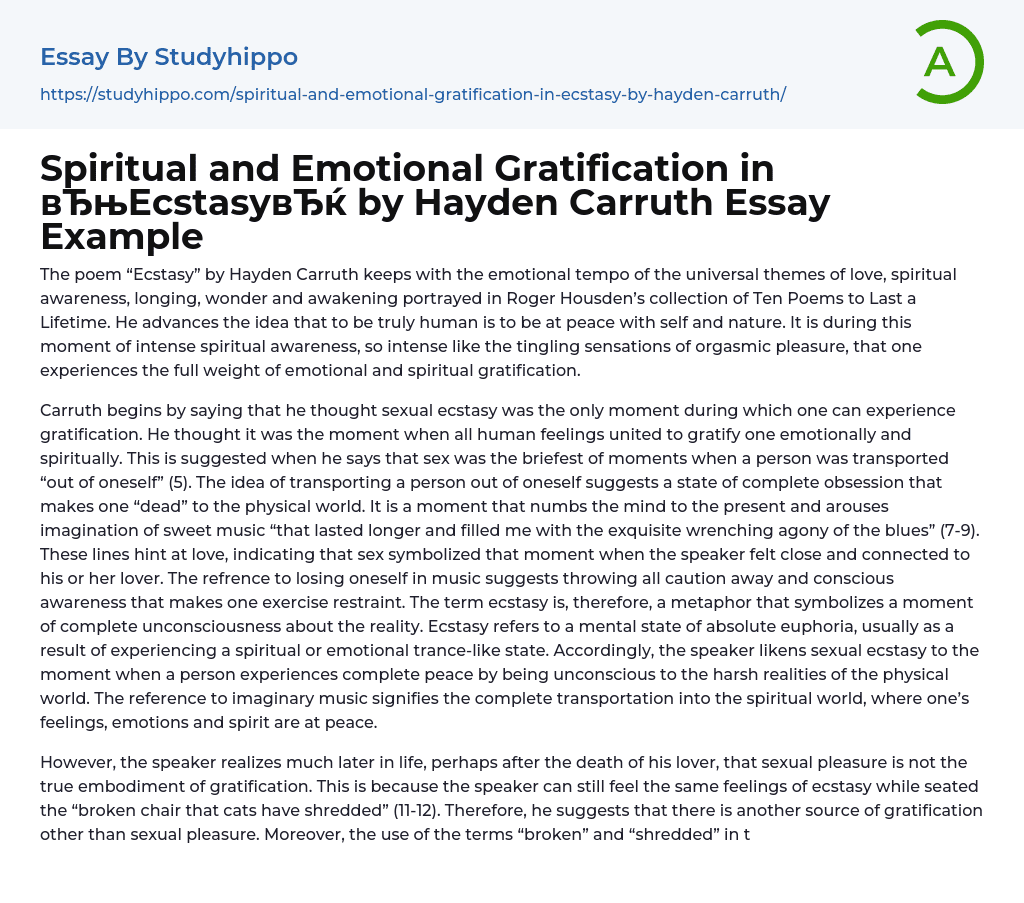

Spiritual and Emotional Gratification in “Ecstasy” by Hayden Carruth Essay Example
The poem “Ecstasy” by Hayden Carruth aligns with the emotional tone of the universal themes encompassing love, spiritual awareness, longing, wonder, and awakening presented in Roger Housden’s anthology of Ten Poems to Last a Lifetime. The poet conveys the concept that genuine humanity involves finding inner tranquility while harmonizing with oneself and the natural world. It is within this instance of profound spiritual realization, comparable to the exhilarating tingling sensations of orgasmic pleasure, that an individual encounters complete emotional and spiritual satisfaction.
Carruth suggests that sexual ecstasy is the only moment when one can experience gratification. He believes it is a moment when all human emotions come together to satisfy a person emotionally and spiritually. The idea of being transported "out of oneself" during sex implies a complete preoccupation that renders one "d
...ead" to the physical world. This moment numbs the mind to the present and awakens an imagination of sweet music that evokes the intense pain of the blues. These lines hint at love, indicating that sex represents a moment when the speaker feels intimately connected to their partner. The mention of losing oneself in music suggests the abandonment of caution and conscious awareness, and serves as a metaphor for throwing away restraint. The term "ecstasy" is metaphorical, symbolizing a moment of complete unawareness of reality. Ecstasy refers to a state of unparalleled euphoria, typically achieved through spiritual or emotional transcendence. In this context, sexual ecstasy is likened to a state of complete peace, where one is unconscious of the harsh realities of the physical world. The reference to imaginary music represents a complete immersion in the spiritual realm, where one's emotions, feelings, and spiri
find contentment.
However, the speaker later realizes in life, possibly after their lover's death, that sexual pleasure doesn't truly bring satisfaction. They can still feel bliss even while sitting in a chair shredded by cats, implying a disruption like a breakup or loss of a partner. Despite this, they can still experience the same fleeting satisfaction as before. Roger Housden's interpretation emphasizes spiritual and emotional contentment, suggesting that the source of gratification isn't tied to the physical world. The speaker calling their feelings "obscure" adds to their mysterious nature. So what could it be? The first clue comes with the lines "by the stove on a winter night with wind and snow howling outside and I imagine the whole world at peace." Wind and snow represent nature.Despite the harsh weather conditions, the speaker's satisfaction comes from feeling a harmonious connection with nature, bringing them a peaceful sensation that cannot be replicated in any other situation. This sense of contentment remains undisturbed even amidst strong winds and snowfall. The greatest joy and delight one can ever experience is found in being in sync with Mother Nature, as it provides an extraordinary and radiant happiness. This comforting emotion embraces the heart and eases the immense pain that one may endure in the physical world.
- Pressure essays
- Confidence essays
- Disgrace essays
- Lost essays
- Harmony essays
- Fairness essays
- Sarcasm essays
- Respect essays
- Responsibility essays
- Empathy essays
- Suffering essays
- Suspense essays
- Fear essays
- Feeling essays
- Loneliness essays
- Ambition essays
- Tolerance essays
- Hope essays
- Inspiration essays
- Kindness essays
- Shame essays
- Desire essays
- Doubt essays
- Grief essays
- Hate essays
- Laughter essays
- Passion essays
- Pride essays
- Forgiveness essays
- Happiness essays
- Humanity essays
- Loyalty essays
- Guilt essays
- Honesty essays
- Betrayal essays
- Need essays
- Boredom essays
- Courage essays
- Regret essays
- Anger essays
- Honor essays
- Honesty Is The Best Policy essays
- Carnival essays
- Festival essays
- Tradition essays
- Easter essays
- Common sense essays
- John Locke essays
- 9/11 essays
- A Good Teacher essays



